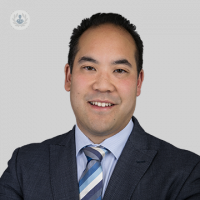Ask an expert: what is the treatment for IBS?
Escrito por:Irritable bowel syndrome (IBS) is a common condition that affects the large intestine of the digestive system. Most often, its symptoms will need to be managed for life.
Here, Dr Derek Chan, highly experienced consultant gastroenterologist, provides an expert insight into irritable bowel syndrome, explaining what are the warning signs to look out for, when should people seek medical attention, and how the condition may be treated.

What is IBS and how does it affect the body?
Irritable bowel syndrome (IBS) is a very common condition that affects many people in the population. A lot of people are actually undiagnosed and do not seek medical help, controlling their symptoms by themselves. IBS can come about in a way of symptoms, particularly with things like abdominal bloating after eating, diarrhoea, constipation, excessive belching, excessive flatus and abdominal pain. Some people can feel quite unwell with these symptoms and it can be a quite debilitating condition to have.
What are the warning signs of IBS?
IBS can present with symptoms of diarrhoea, constipation, bloating and abdominal pain. It is important that these symptoms are assessed properly, just to make sure that there are no other causes for these symptoms. If people who have these symptoms are able to manage them through diet or a change in lifestyle, then that is fine, and a proportion of people can manage things this way.
However, a proportion of patients will still struggle despite making changes to their diet and lifestyle. They are the patients who really need to be investigated further to make sure that there is nothing else that is being missed. Treatment can then be more focused for IBS.
Are some people more likely to develop IBS than others?
There are some people who seen more predisposed to IBS, such as younger people. They tend to experience IBS more, although not exactly sure why. There are some diets and lifestyles that can predispose people more to symptoms of IBS as well.
There also seems to be some genetic factors, potentially. It might be that a person’s parents or siblings also have IBS, and thus, the condition can seem more common in those groups of patients.
When should people see a doctor?
The main driving force to see a doctor is if people have had IBS symptoms for a long period of time and they are struggling with these symptoms. They will need to see a doctor, just to see if there is anything else that can be done to help with their symptoms, but also to investigate things to make sure nothing else has been missed.
It is also important to note if there is a change in symptoms. For example, if people usually have a normal bowel habit, but suddenly for a few weeks, they've had a change in their bowel habits and suffered with bloating. This is when people need to be investigated as well.
So, a change or if symptoms have been going on for a long period of time and you are struggling because of them - this is when people should seek help from a medical professional.
Is treatment always required?
Treatment can vary from just making some changes to a person’s diet and lifestyle, and a proportion of patients usually gets better with these sorts of changes.
However, a proportion of patients need more specialist help and, at this point, seeing a specialist gastrointestinal dietician can often help, by going through specific diets to try and pinpoint what foods are making things worse. They can also talk about things regarding mindfulness, because we know that the gut and brain access have a strong interplay and strong interrelationship, meaning that if people are stressed or anxious for whatever reason, that can often affect symptoms in their gut, as well as elsewhere.
If people really do struggle despite making dietary and lifestyle changes, then there are lots of medications that can be tried if needs to be. However, in my case, I tend to prefer trying the routes of dietary and lifestyle manipulation in the first instance before going onto medication, if required.
Dr Derek Chan is a highly experienced consultant gastroenterologist based in Sutton and Ashtead who specialises in functional bowel disorders, including irritable bowel syndrome.
If you have symptoms of irritable bowel syndrome and require expert treatment, don’t hesitate to visit Dr Chan’s Top Doctors profile today.


